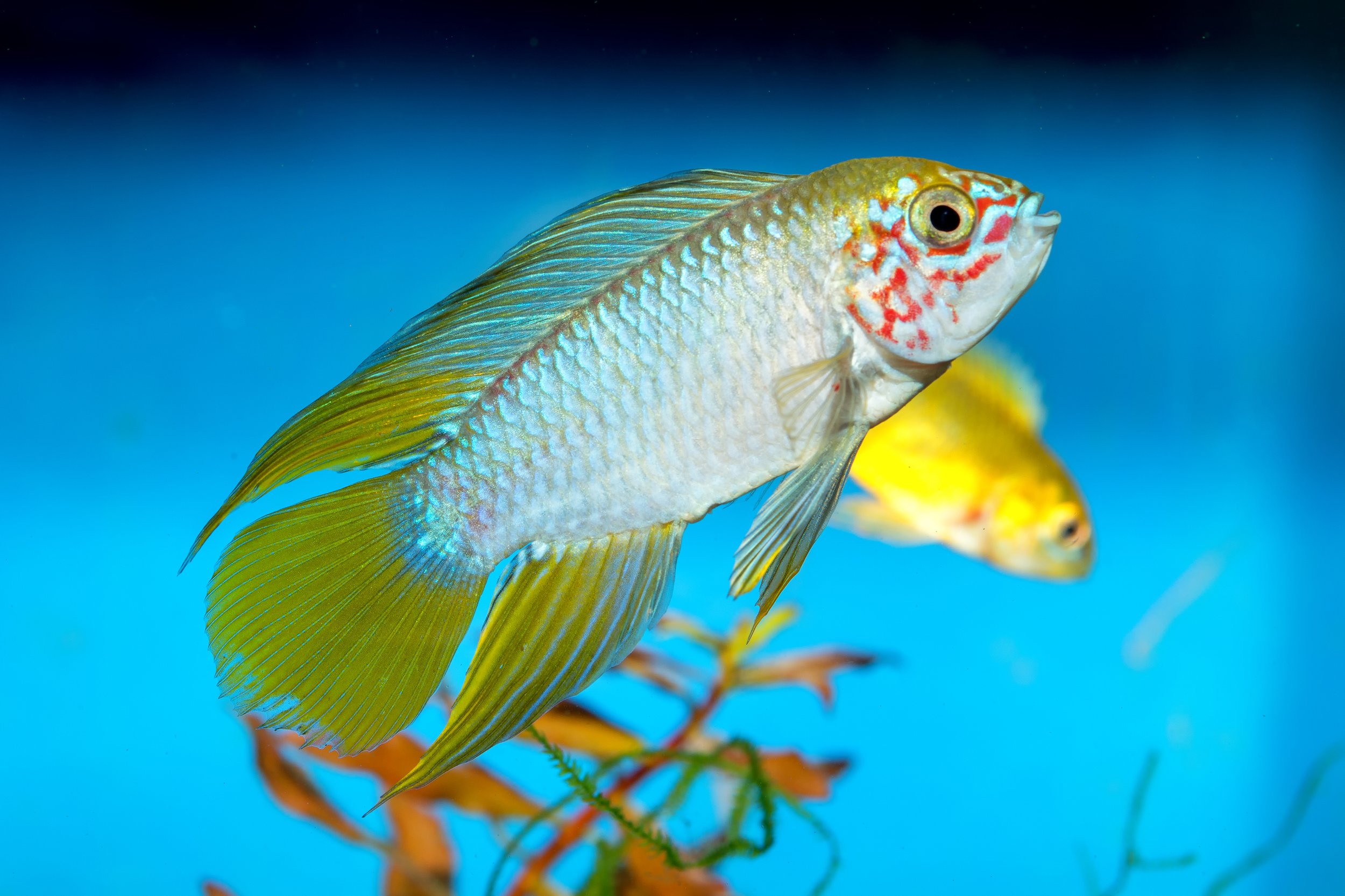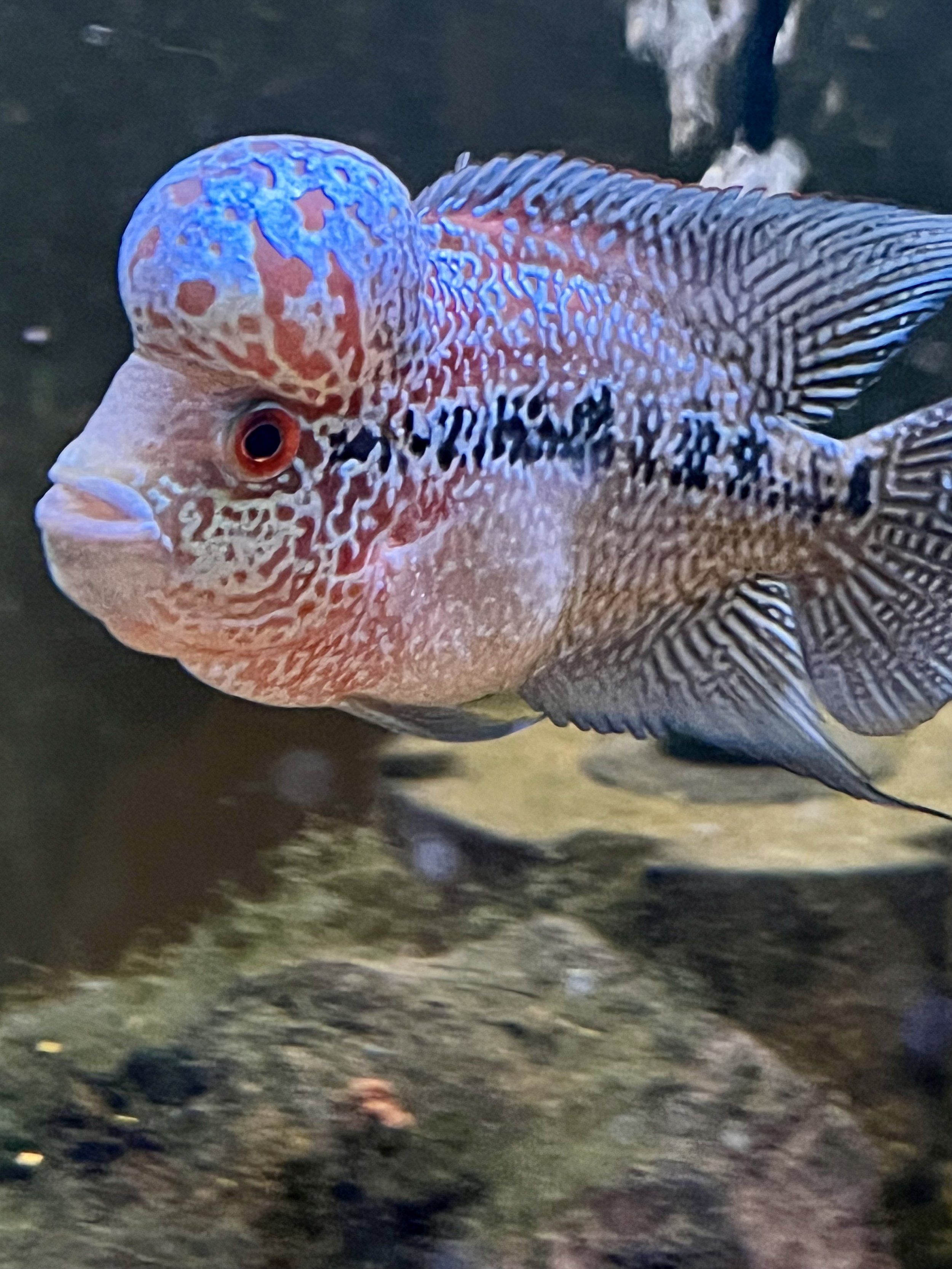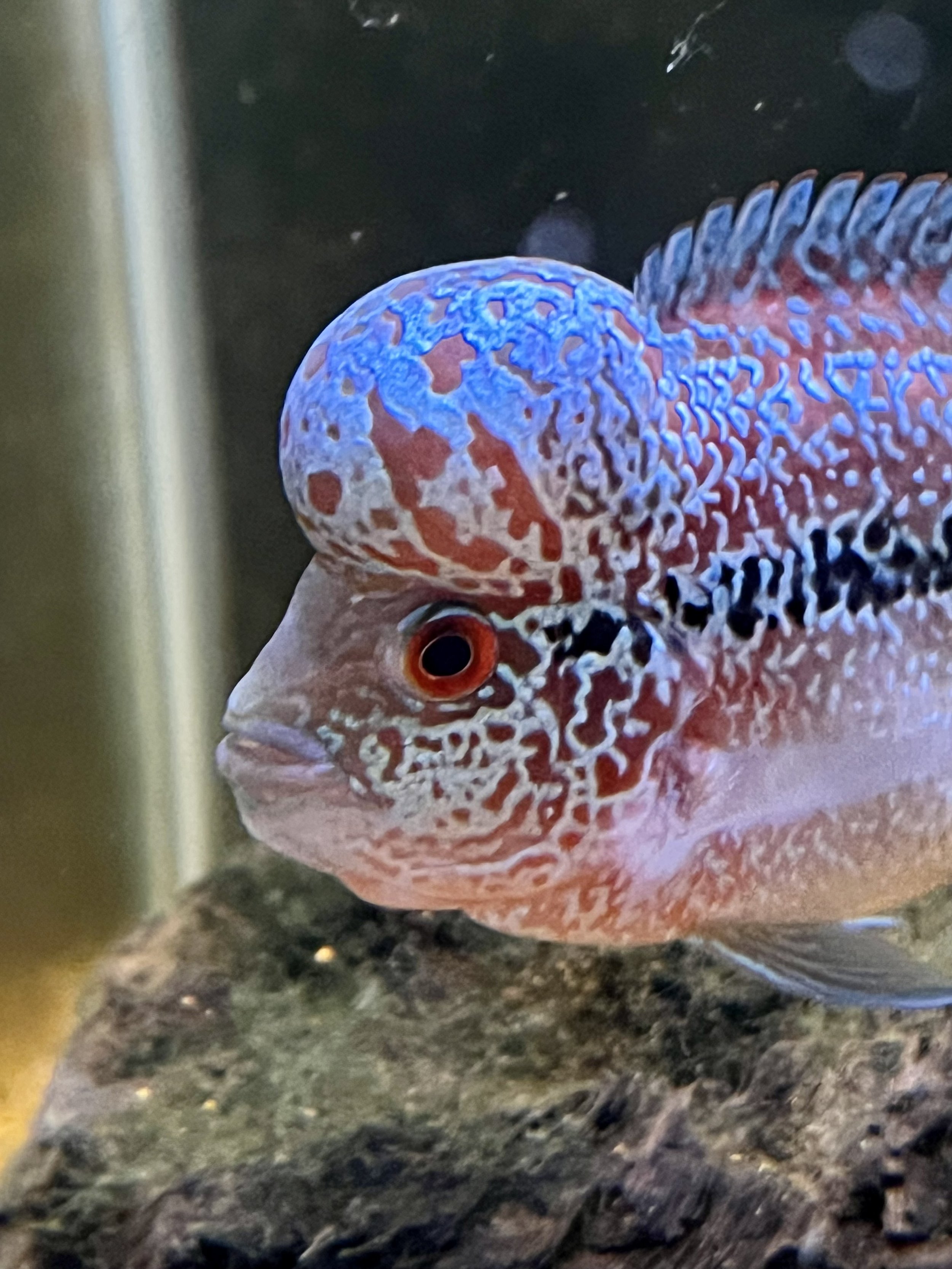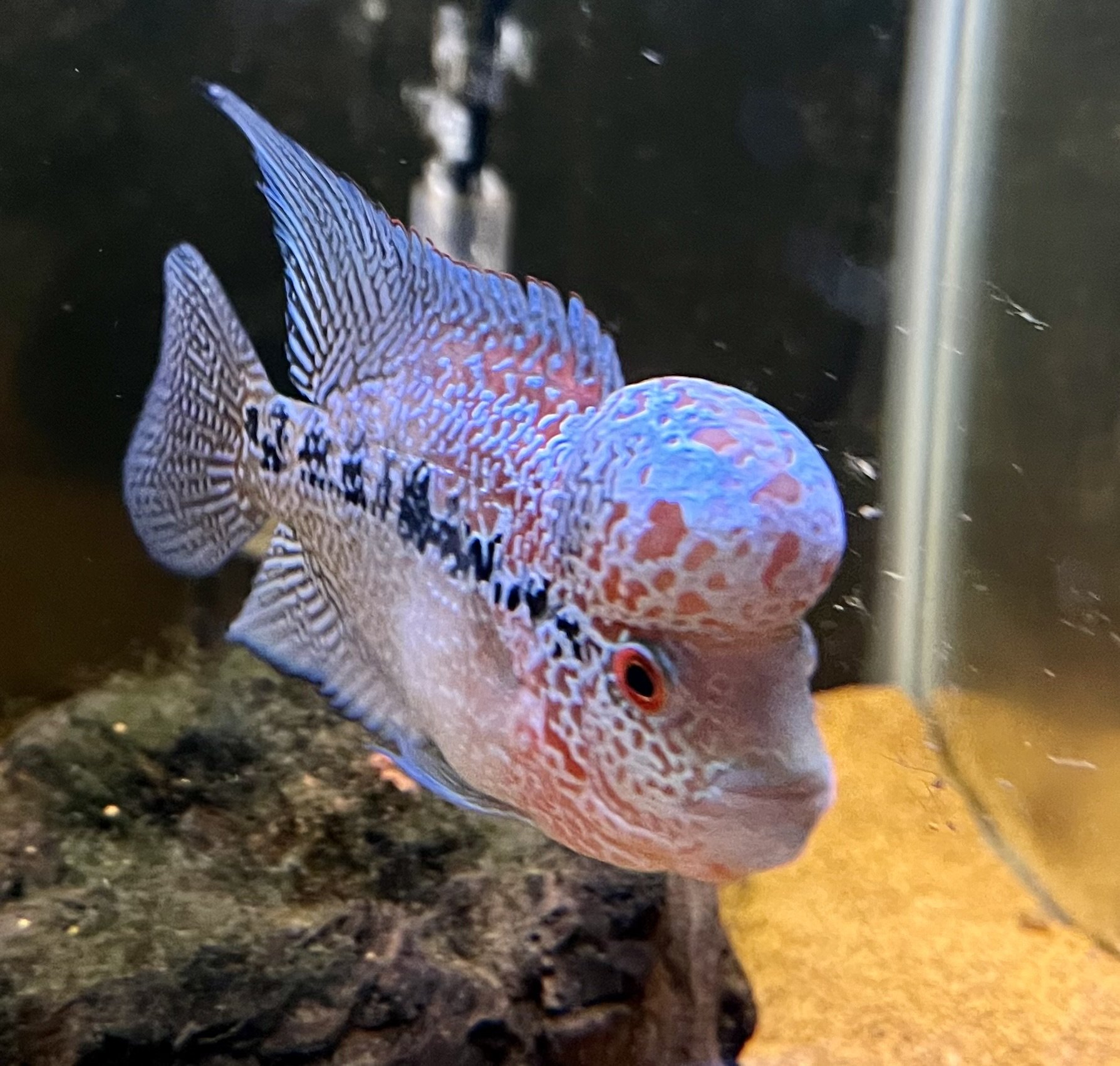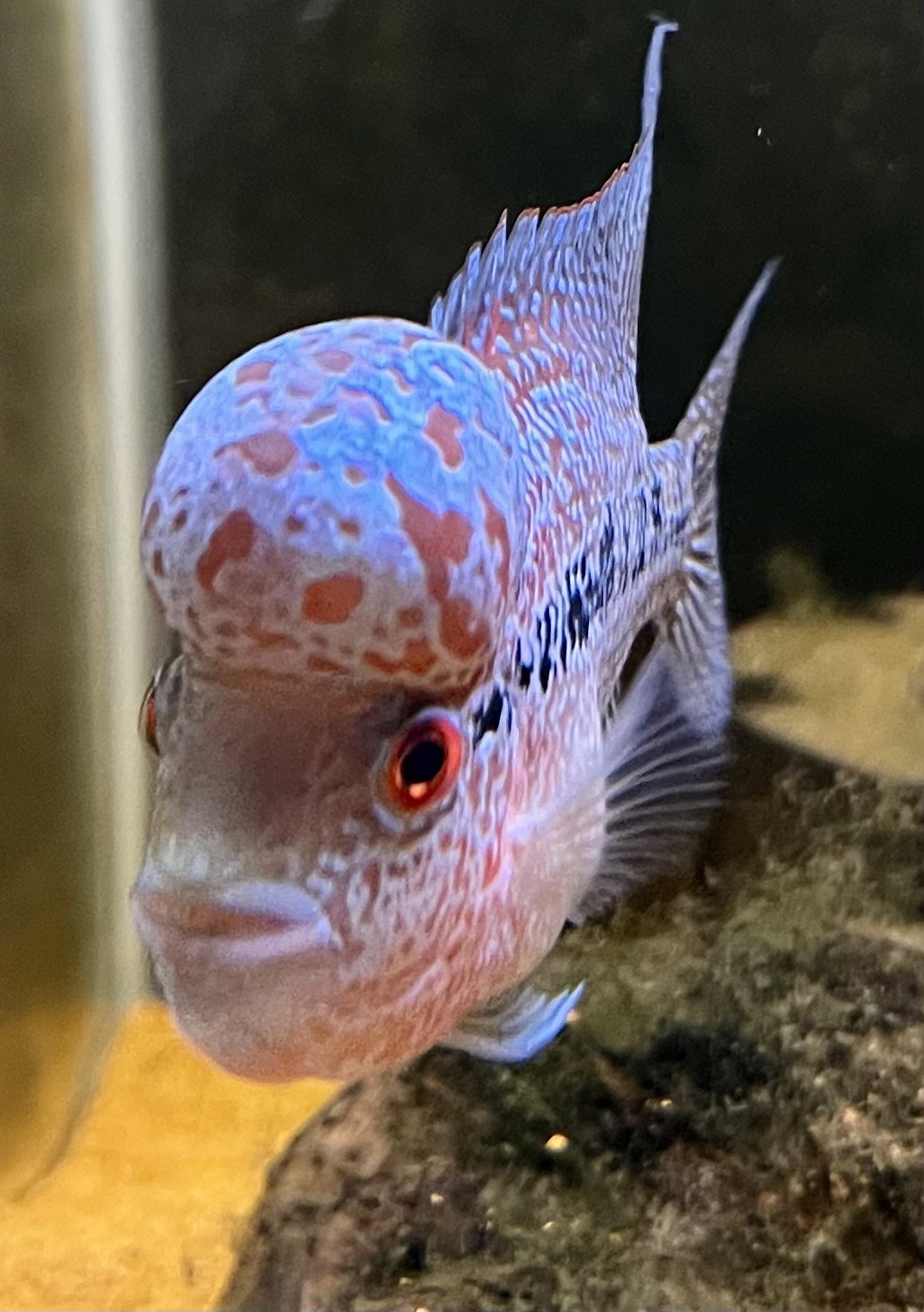 Image 1 of 2
Image 1 of 2

 Image 2 of 2
Image 2 of 2



Cupid Cichlid-3-4"
The Cupid Cichlid, scientifically known as Biotodoma cupido, is a beautiful and peaceful freshwater fish native to the Amazon River Basin in South America. Found in slow-moving rivers, streams, and floodplain areas, this species is known for its subtle coloration, unique markings, and gentle temperament, making it a popular choice for community aquariums and South American biotope setups.
Physically, the Cupid Cichlid has a rounded, laterally compressed body with a silvery base color that reflects iridescent shades of green, blue, or gold, depending on the light and the individual fish. A distinct black blotch can be found near the center of the body, which varies slightly in shape among individuals. The fins are often accented with subtle blue or red highlights, particularly in mature males. Adults typically grow to a size of 4 to 5 inches (10 to 12 centimeters), making them manageable for medium to large aquariums.
In the aquarium, Cupid Cichlids thrive in a well-decorated tank with plenty of hiding spots, such as driftwood, rocks, and dense vegetation. A soft, sandy substrate is ideal, as these fish enjoy sifting through the sand while foraging for food. A tank of at least 40 gallons is recommended for a pair, with larger tanks required if housing multiple individuals or other tank mates. Adding leaf litter and subdued lighting can help replicate their natural environment and reduce stress.
Water parameters for Cupid Cichlids should closely mimic their native habitat. They prefer soft, slightly acidic water with a pH range of 5.5 to 7.0 and temperatures between 75 to 82°F (24 to 28°C). Clean, well-oxygenated water is essential for their health, so regular water changes and efficient filtration are crucial.
Feeding Cupid Cichlids is straightforward, as they are omnivorous and will accept a wide variety of foods. A diet of high-quality sinking pellets or granules should be supplemented with live or frozen foods such as brine shrimp, bloodworms, and daphnia. They also benefit from occasional offerings of vegetable matter, such as spirulina-based foods or blanched spinach, to ensure a balanced diet.
Cupid Cichlids are generally peaceful and make excellent tank mates for other non-aggressive fish that share similar water requirements. Suitable companions include small tetras, Corydoras catfish, dwarf cichlids, and peaceful plecos. Avoid housing them with overly aggressive or highly territorial species.
Breeding Cupid Cichlids in captivity is possible with proper care and the right conditions. They are biparental substrate spawners, with pairs forming strong bonds and working together to guard their eggs and fry. Spawning typically occurs on flat surfaces, such as rocks or driftwood. The eggs hatch within 3 to 4 days, and the fry become free-swimming after about a week. The fry can be fed infusoria or finely crushed fry food, transitioning to baby brine shrimp as they grow.
Overall, the Cupid Cichlid (Biotodoma cupido) is a peaceful and attractive species that brings elegance and charm to freshwater aquariums. Its manageable size, calm demeanor, and unique coloration make it a rewarding choice for aquarists seeking a distinctive cichlid for their tank.
The Cupid Cichlid, scientifically known as Biotodoma cupido, is a beautiful and peaceful freshwater fish native to the Amazon River Basin in South America. Found in slow-moving rivers, streams, and floodplain areas, this species is known for its subtle coloration, unique markings, and gentle temperament, making it a popular choice for community aquariums and South American biotope setups.
Physically, the Cupid Cichlid has a rounded, laterally compressed body with a silvery base color that reflects iridescent shades of green, blue, or gold, depending on the light and the individual fish. A distinct black blotch can be found near the center of the body, which varies slightly in shape among individuals. The fins are often accented with subtle blue or red highlights, particularly in mature males. Adults typically grow to a size of 4 to 5 inches (10 to 12 centimeters), making them manageable for medium to large aquariums.
In the aquarium, Cupid Cichlids thrive in a well-decorated tank with plenty of hiding spots, such as driftwood, rocks, and dense vegetation. A soft, sandy substrate is ideal, as these fish enjoy sifting through the sand while foraging for food. A tank of at least 40 gallons is recommended for a pair, with larger tanks required if housing multiple individuals or other tank mates. Adding leaf litter and subdued lighting can help replicate their natural environment and reduce stress.
Water parameters for Cupid Cichlids should closely mimic their native habitat. They prefer soft, slightly acidic water with a pH range of 5.5 to 7.0 and temperatures between 75 to 82°F (24 to 28°C). Clean, well-oxygenated water is essential for their health, so regular water changes and efficient filtration are crucial.
Feeding Cupid Cichlids is straightforward, as they are omnivorous and will accept a wide variety of foods. A diet of high-quality sinking pellets or granules should be supplemented with live or frozen foods such as brine shrimp, bloodworms, and daphnia. They also benefit from occasional offerings of vegetable matter, such as spirulina-based foods or blanched spinach, to ensure a balanced diet.
Cupid Cichlids are generally peaceful and make excellent tank mates for other non-aggressive fish that share similar water requirements. Suitable companions include small tetras, Corydoras catfish, dwarf cichlids, and peaceful plecos. Avoid housing them with overly aggressive or highly territorial species.
Breeding Cupid Cichlids in captivity is possible with proper care and the right conditions. They are biparental substrate spawners, with pairs forming strong bonds and working together to guard their eggs and fry. Spawning typically occurs on flat surfaces, such as rocks or driftwood. The eggs hatch within 3 to 4 days, and the fry become free-swimming after about a week. The fry can be fed infusoria or finely crushed fry food, transitioning to baby brine shrimp as they grow.
Overall, the Cupid Cichlid (Biotodoma cupido) is a peaceful and attractive species that brings elegance and charm to freshwater aquariums. Its manageable size, calm demeanor, and unique coloration make it a rewarding choice for aquarists seeking a distinctive cichlid for their tank.
The Cupid Cichlid, scientifically known as Biotodoma cupido, is a beautiful and peaceful freshwater fish native to the Amazon River Basin in South America. Found in slow-moving rivers, streams, and floodplain areas, this species is known for its subtle coloration, unique markings, and gentle temperament, making it a popular choice for community aquariums and South American biotope setups.
Physically, the Cupid Cichlid has a rounded, laterally compressed body with a silvery base color that reflects iridescent shades of green, blue, or gold, depending on the light and the individual fish. A distinct black blotch can be found near the center of the body, which varies slightly in shape among individuals. The fins are often accented with subtle blue or red highlights, particularly in mature males. Adults typically grow to a size of 4 to 5 inches (10 to 12 centimeters), making them manageable for medium to large aquariums.
In the aquarium, Cupid Cichlids thrive in a well-decorated tank with plenty of hiding spots, such as driftwood, rocks, and dense vegetation. A soft, sandy substrate is ideal, as these fish enjoy sifting through the sand while foraging for food. A tank of at least 40 gallons is recommended for a pair, with larger tanks required if housing multiple individuals or other tank mates. Adding leaf litter and subdued lighting can help replicate their natural environment and reduce stress.
Water parameters for Cupid Cichlids should closely mimic their native habitat. They prefer soft, slightly acidic water with a pH range of 5.5 to 7.0 and temperatures between 75 to 82°F (24 to 28°C). Clean, well-oxygenated water is essential for their health, so regular water changes and efficient filtration are crucial.
Feeding Cupid Cichlids is straightforward, as they are omnivorous and will accept a wide variety of foods. A diet of high-quality sinking pellets or granules should be supplemented with live or frozen foods such as brine shrimp, bloodworms, and daphnia. They also benefit from occasional offerings of vegetable matter, such as spirulina-based foods or blanched spinach, to ensure a balanced diet.
Cupid Cichlids are generally peaceful and make excellent tank mates for other non-aggressive fish that share similar water requirements. Suitable companions include small tetras, Corydoras catfish, dwarf cichlids, and peaceful plecos. Avoid housing them with overly aggressive or highly territorial species.
Breeding Cupid Cichlids in captivity is possible with proper care and the right conditions. They are biparental substrate spawners, with pairs forming strong bonds and working together to guard their eggs and fry. Spawning typically occurs on flat surfaces, such as rocks or driftwood. The eggs hatch within 3 to 4 days, and the fry become free-swimming after about a week. The fry can be fed infusoria or finely crushed fry food, transitioning to baby brine shrimp as they grow.
Overall, the Cupid Cichlid (Biotodoma cupido) is a peaceful and attractive species that brings elegance and charm to freshwater aquariums. Its manageable size, calm demeanor, and unique coloration make it a rewarding choice for aquarists seeking a distinctive cichlid for their tank.




